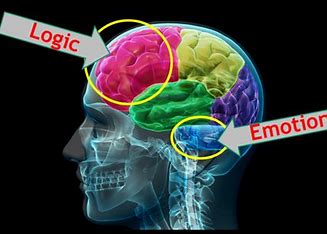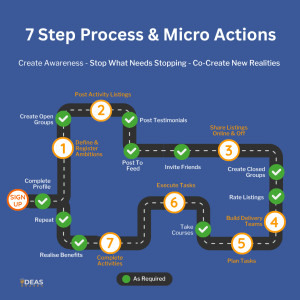Why Logic Must Lead Humanity Away From Failure
Ready to go logical?
Section 1 - Header
Section 2 - Top 100 Rating
You must be logged in to rate.
Section 3 - Core Info
Section 4 - Detailed Info
Escaping the Emotional Frequency Trap
We live in a world tuned for our emotions. Social media, advertising, political campaigns - they all tap into fear, excitement, outrage, or desire. Emotion dominates because it’s immediate, visceral, and contagious. But here’s the question: are we being primed to feel before we think, because it makes us easier to control?
The Emotional Frequency
Emotion operates on a reactive frequency. It’s fast, instinctive, and often unconscious. Anger, excitement, or anxiety can hijack our attention and decision-making. On this lower frequency, we are:
>>> Easily influenced: Emotional triggers can bypass rational thought.
>>> Short-sighted: Decisions favor instant gratification or relief over long-term results.
>>> Susceptible to manipulation: Emotional resonance sells products, sways opinions, and drives social trends.
In other words, the emotional frequency is a powerful amplifier - but it’s also a leash.
Logic: Operating on a Higher Frequency
Logic functions on a slower, higher frequency. It allows us to:
>>> Step back from immediate reactions and evaluate options objectively.
>>> Analyse and plan for consequences and risks.
>>> Prioritise long-term outcomes over fleeting impulses.
By initiating from logic, we are less likely to be manipulated. Logic enables conscious choice, not reactive conformity. Even in situations saturated with emotional priming, logic lets us regain control.
Emotion Isn’t the Enemy - It’s the Amplifier
Emotion has a role: it motivates, excites, and inspires action. But without logic, emotion can be hijacked, leading to poor decisions or manipulated behaviour.
Think of it as a frequency spectrum:
>>> Low frequency: Reactivity, emotional hijack, impulsive action.
>>> Mid frequency: Awareness of emotional triggers, some reflection.
>>> High frequency: Logic-led action, intentional choice, sustainable impact.
When we shift our initiation from emotion to logic, we move higher on the spectrum—toward control, empowerment, and clarity. Emotion still fuels energy, but logic dictates direction.
Are We Being Primed to Stay Reactive?
Consider how our environment and messaging on the TV, or by Politicians constantly pulls on emotions:
>>> Viral content designed to provoke outrage.
>>> Advertising that exploits desire or fear.
>>> News cycles emphasizing drama over context.
All of these operate on lower frequencies, keeping us reactive and easier to influence. By contrast, logic requires deliberate attention - it’s slower, conscious, and less “clickable.” This explains why society tends to favour emotional triggers: it’s easier to control behaviour when people act emotionally rather than rationally.
Shifting the Initiation Point
Logic can and should initiate action even in emotionally charged environments. By doing so, we:
>>> Retain agency over decisions.
>>> Choose actions aligned with values and goals.
>>> Prevent manipulation from external stimuli.
>>> Channel emotional energy into structured, measurable outcomes.
In other words, logic doesn’t suppress emotion - it harnesses it, converting reactive energy into intentional progress.
Takeaway
Emotion dominates because it’s immediate and reactive - but logic operates on a higher frequency, giving us control, clarity, and long-term impact. Being aware of how we’re primed emotionally allows us to initiate from logic first, using emotion as a catalyst rather than a hijacker.
Feel the energy, but lead with thought. That’s the path to empowerment, measurable action, and freedom from manipulation.
Section 6 - Next Steps
Section 7 - Location
Section 8 - Interest Areas
Section 10 - Contact Details
Section 11 - Listing Reviews
Login to Write Your ReviewThere are no reviews yet.



